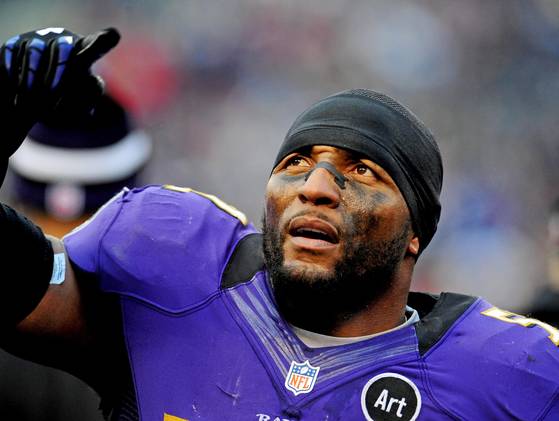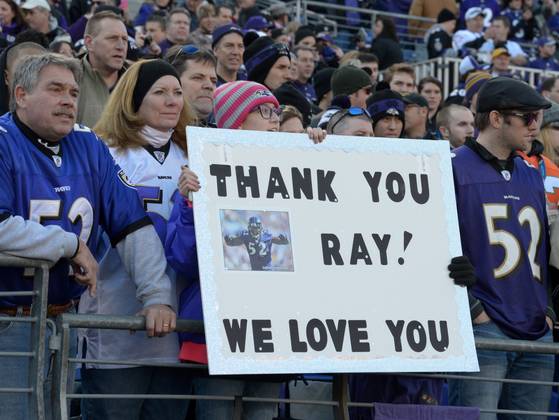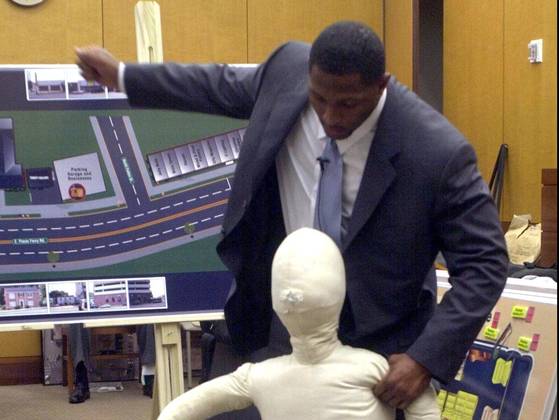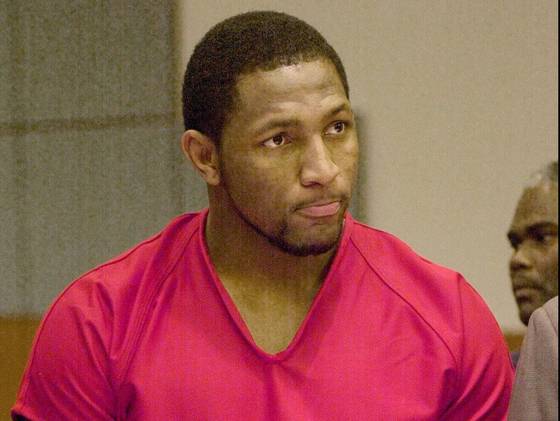It has been 13 years since two friends were murdered in Atlanta after the Super Bowl, and their families still question the involvement of the Ravens linebacker. 
Ravens linebacker Ray Lewis says he will retire at the end of the playoffs after 17 seasons in the NFL. (Photo: Evan Habeeb, USA TODAY Sports) Story Highlights - Ray Lewis pleaded guilty to obstruction of justice after being charged with two counts of murder
- "Everything is so fresh in our mind, it's just like it happened yesterday," says Greg Wilson
- Family tries to shield Richard Lollar's 12-year-old daughter from details of the murder
Priscilla Lollar still doesn't believe her son is dead.
Any day now, she hopes he might finally return from Atlanta, walking through the door of her home in Akron, Ohio, as if nothing happened on the morning of Jan. 31, 2000.
"If I truly accept that he's not coming back ... " says Lollar, her voice trailing off. "I don't discuss him in the past. I don't really acknowledge anything."
Deep down, she knows he's gone . She knows it every time she turns on the television and sees Baltimore Ravens linebacker Ray Lewis — a reminder that her son, Richard, has been dead for 13 years, stabbed to death outside a nightclub in Atlanta, along with his friend from Akron, Jacinth Baker.
RETIREMENT: Commissioner has a job for Lewis
Their murders remain unsolved. But as the anniversary of their deaths approaches — and as Lewis dances into the sunset of his NFL career — the victims' relatives are still seething at him. While Priscilla Lollar says she's "numb" to Lewis, others want answers. And justice.
"My nephew was brutally beaten and murdered and nobody is paying for it," Baker's uncle, Greg Wilson, told USA TODAY Sports. "Everything is so fresh in our mind, it's just like it happened yesterday. We'll never forget this."
Only Lewis pleaded guilty in relation to the case: for obstruction of justice, a misdemeanor. He originally was charged with two counts of murder but struck a deal with prosecutors in exchange for his testimony against two of his companions that night, Richard Oakley and Joseph Sweeting.
Lewis never implicated his two friends at trial, and they were acquitted. Lewis had testified that Oakley, Sweeting and another man had gone to a sporting goods store the previous day to buy knives. Baker's blood later was found in Lewis' limo. Having fled the crime scene, Lewis told the limo's passengers to "keep their mouths shut." The white suit Lewis was wearing that night — on Super Bowl Sunday — never was found.
"I'm not trying to end my career like this," Lewis said in his hotel that night, according to the testimony of a female passenger in the limo.
He didn't. For his punishment, Lewis received one year of probation and a $250,000 fine by the NFL.
Lewis declined comment when asked about the subject Thursday by USA TODAY Sports. Messages left for agents and attorneys representing him were not returned. Oakley, recently living in Atlanta, didn't return messages seeking comment. The family for Sweeting, living in Miami, hung up when reached by USA TODAY Sports. And the prosecutor, Paul Howard, declined a request to be interviewed.
Said Lewis: "You want to talk to me about something that happened 13 years ago, right now?"
In that time , Lewis has not only rehabilitated his image but become an iconic figure for his dominating play and leadership. His 17-year career is likely to be immortalized in the Pro Football Hall of Fame in Canton, Ohio, about 20 miles south of Akron, where Lollar and Baker are buried near their families. 
Ravens fans express their gratitude to Ray Lewis in his final home game before retiring. The linebacker has been honored by people fans and others, including Commissioner Roger Goodell. (Photo: Kirby Lee, USA TODAY Sports) Lewis, 37, will be eligible for induction five years after his retirement this season, which could come as soon as Saturday if the Ravens lose their playoff game at Denver. After announcing his retirement, Lewis has basked in the praise of adoring NFL fans. The crowd roared as he took a victory lap — and dance — around the stadium Sunday after beating the Indianapolis Colts. Commissioner Roger Goodell even said he wants to employ Lewis as a special adviser to himself because he's a "tremendous voice of reason."
Cindy Lollar-Owens, Richard Lollar's aunt, says Lewis' pending retirement prompted her Thursday to visit the funeral home, "because that's where my nephew retired."
Lollar-Owens says she doesn't know if Lewis did or didn't stab anybody — just that Lewis was there and that evidence suggests he was involved. For his part, Lewis denied guilt in the stabbing and said that he was unfairly targeted by Howard. Lewis said he didn't know who did the stabbings amid the push and pull of a crowded fight around 4 a.m.
It's not enough for some family members.
"Every time I see him, I think of my nephew," Lollar-Owens says.
The victims
Baker and Lollar were 21 and 24 at the times of their deaths, both having been stabbed several times in the heart and upper body.
Both had overcome personal struggles before that night. Lollar's mother had been in and out of prison, leaving Owens and her mother to raise Richard. Both Lollar and Baker had criminal records with minor drug-related offenses.
But they moved from Akron to Atlanta in search of a better life. Lollar was trying to make it there as a barber, Baker as an artist. Lollar also was ready to have a family. His fiancé, Kellye Smith, was pregnant with his daughter, born about a month after his murder.
The daughter is now 12 and attends a private school near Atlanta. The family says it tries to shield her from the details of her father's death.
"She just knows her father is not here," says Katheryn Smith, mother of Kellye Smith. "She doesn't really know what happened. So far, we've kept most of it from her."
Katheryn Smith says she harbors no grudge against Lewis, though the circumstances are different from those of other relatives. 
Ray Lewis testifies in June 2000 during the murder trial of Richard Oakley and Joseph Sweeting. (Photo: KIMBERLY SMITH, AFP/Getty Images) Smith's family sued Lewis for $13 million and reached an undisclosed settlement on behalf of Richard Lollar's daughter in 2004.
In the suit, Lewis answered questions under oath in a deposition.
"His attitude during the deposition and everything wasn't that great," Katheryn Smith says of Lewis. "He disappointed me in the things he said. But I decided I wasn't the one (to judge). You have to leave that up to God, you know? He was there when it happened. I think they all got off fairly easy, but I don't have any hard feelings. I think he had a bad choice of friends."
She declined to elaborate on Lewis' deposition testimony, which has not been disclosed. Kellye Smith didn't return a message seeking comment. The settlement includes a confidentiality clause.
In another suit, Gladys Robinson, Baker's grandmother, also reached an undisclosed settlement with Lewis in 2003 after suing him for $10 million. She is now deceased.
Time with family
The way Priscilla Lollar remembers it, her son was supposed to come back to Akron soon after Jan. 31, 2000. He was supposed to pick her up and bring her down to Atlanta, where he could help keep her out of trouble. She says she was at a friend's house when her phone rang that day. It was her stepfather, who told her to come home.
When she learned from him what happened, "I didn't believe it," she says. She still doesn't. "I'm numb to the fact, ever after all this time." 
Ray Lewis listens to the proceedings in Atlanta Municipal Court during his preliminary hearing on Feb. 1, 2000. Lewis eventually pleaded guilty to obstruction of justice. (Photo: ERIK S. LESSER, Associated Press) Her sister, Cindy Lollar Owens, still wants to believe that Lewis feels their loss. Explaining why he was retiring now, Lewis recently said he wanted to spend more time with his children.
"I've seen where he was speaking about family and stuff, and I'm quite sure that every time he sees his son, he thinks about the son, grandson and father that we lost," Owens says. "It would be impossible not to. Never a day goes by that we don't think about him."
For "closure," she wants to talk to Lewis. If she gets the chance, Owens says she would ask him for money, not for herself, but to build a beauty salon in the name of her nephew, the barber.
"That would be my kind of closure, because I would have his memory," she says.
She also wants the truth. "I would like for him to tell one day exactly what happened," Owens says.
It might help relieve the pain and anger for her mother, Joyce Lollar, who fell sick with heart trouble last month.
Joyce Lollar has bristled at the sight of Lewis on TV, a feeling shared by Greg Wilson, the uncle who helped raise Baker.
"I cringe. I just cringe," Wilson says of seeing Lewis on television. He's upset at how the case was handled by Howard. He also blames the NFL and Ravens. Prior to the next Super Bowl in 2001, then-Ravens coach Brian Billick criticized the news media for continuing to ask questions about the murders.
"The problem to me is America was more interested in him playing football instead of him paying the price for what he was involved in," Wilson says. "That's how we feel. They wanted nothing to happen to him. (Team owner) Art Modell didn't want his golden boy to suffer, so he could make money for him. So they did all they could to get him out of trouble."
The other men moved on after their acquittals. Oakley published an unedited book on the murders entitled Murder After Super Bowl XXXIV, copyrighted in 2010.
In the book's opening, Oakley describes a chaotic scene with several fights breaking out. He describes Lewis imploring his friends to get into his limo. He describes a man staggering in the street holding his side before "falling backward onto the street." He later describes three other men getting into the limo saying, "We kicked they ass."
The rest of the book is unavailable and out of print.
Wilson says there was supposed to be a meeting with Lewis and the families after the trial. It never happened.
"We wouldn't have went to the meeting anyway," Wilson says. "It would not have been a peaceful meeting. … I'll be very upset if they induct (Lewis) into the Hall of Fame. There's other people out there that committed a lesser crime and they're sitting in jail."
Baker, his nephew, "was raised in our home," Wilson says. "We have no compassion for Ray Lewis, for Art Modell, for any of them. We don't want to see him."
Contributing: Robert Klemko in Owings Mills, Md.
Source : http://www.usatoday.com/story/sports/nfl/2013/01/10/ray-lewis-baltimore-ravens-atlanta-murder-2000/1566198/

Ravens linebacker Ray Lewis says he will retire at the end of the playoffs after 17 seasons in the NFL. (Photo: Evan Habeeb, USA TODAY Sports) Priscilla Lollar still doesn't believe her son is dead. Any day now, she hopes he might finally return from Atlanta, walking through the door of her home in Akron, Ohio, as if nothing happened on the morning of Jan. 31, 2000. "If I truly accept that he's not coming back ... " says Lollar, her voice trailing off. "I don't discuss him in the past. I don't really acknowledge anything." Deep down, she knows he's gone . She knows it every time she turns on the television and sees Baltimore Ravens linebacker Ray Lewis — a reminder that her son, Richard, has been dead for 13 years, stabbed to death outside a nightclub in Atlanta, along with his friend from Akron, Jacinth Baker. RETIREMENT: Commissioner has a job for Lewis Their murders remain unsolved. But as the anniversary of their deaths approaches — and as Lewis dances into the sunset of his NFL career — the victims' relatives are still seething at him. While Priscilla Lollar says she's "numb" to Lewis, others want answers. And justice. "My nephew was brutally beaten and murdered and nobody is paying for it," Baker's uncle, Greg Wilson, told USA TODAY Sports. "Everything is so fresh in our mind, it's just like it happened yesterday. We'll never forget this." Only Lewis pleaded guilty in relation to the case: for obstruction of justice, a misdemeanor. He originally was charged with two counts of murder but struck a deal with prosecutors in exchange for his testimony against two of his companions that night, Richard Oakley and Joseph Sweeting. Lewis never implicated his two friends at trial, and they were acquitted. Lewis had testified that Oakley, Sweeting and another man had gone to a sporting goods store the previous day to buy knives. Baker's blood later was found in Lewis' limo. Having fled the crime scene, Lewis told the limo's passengers to "keep their mouths shut." The white suit Lewis was wearing that night — on Super Bowl Sunday — never was found. "I'm not trying to end my career like this," Lewis said in his hotel that night, according to the testimony of a female passenger in the limo. He didn't. For his punishment, Lewis received one year of probation and a $250,000 fine by the NFL. Lewis declined comment when asked about the subject Thursday by USA TODAY Sports. Messages left for agents and attorneys representing him were not returned. Oakley, recently living in Atlanta, didn't return messages seeking comment. The family for Sweeting, living in Miami, hung up when reached by USA TODAY Sports. And the prosecutor, Paul Howard, declined a request to be interviewed. Said Lewis: "You want to talk to me about something that happened 13 years ago, right now?" In that time , Lewis has not only rehabilitated his image but become an iconic figure for his dominating play and leadership. His 17-year career is likely to be immortalized in the Pro Football Hall of Fame in Canton, Ohio, about 20 miles south of Akron, where Lollar and Baker are buried near their families. Ravens fans express their gratitude to Ray Lewis in his final home game before retiring. The linebacker has been honored by people fans and others, including Commissioner Roger Goodell. (Photo: Kirby Lee, USA TODAY Sports) Lewis, 37, will be eligible for induction five years after his retirement this season, which could come as soon as Saturday if the Ravens lose their playoff game at Denver. After announcing his retirement, Lewis has basked in the praise of adoring NFL fans. The crowd roared as he took a victory lap — and dance — around the stadium Sunday after beating the Indianapolis Colts. Commissioner Roger Goodell even said he wants to employ Lewis as a special adviser to himself because he's a "tremendous voice of reason." Cindy Lollar-Owens, Richard Lollar's aunt, says Lewis' pending retirement prompted her Thursday to visit the funeral home, "because that's where my nephew retired." Lollar-Owens says she doesn't know if Lewis did or didn't stab anybody — just that Lewis was there and that evidence suggests he was involved. For his part, Lewis denied guilt in the stabbing and said that he was unfairly targeted by Howard. Lewis said he didn't know who did the stabbings amid the push and pull of a crowded fight around 4 a.m. It's not enough for some family members. "Every time I see him, I think of my nephew," Lollar-Owens says. The victims Baker and Lollar were 21 and 24 at the times of their deaths, both having been stabbed several times in the heart and upper body. Both had overcome personal struggles before that night. Lollar's mother had been in and out of prison, leaving Owens and her mother to raise Richard. Both Lollar and Baker had criminal records with minor drug-related offenses. But they moved from Akron to Atlanta in search of a better life. Lollar was trying to make it there as a barber, Baker as an artist. Lollar also was ready to have a family. His fiancé, Kellye Smith, was pregnant with his daughter, born about a month after his murder. The daughter is now 12 and attends a private school near Atlanta. The family says it tries to shield her from the details of her father's death. "She just knows her father is not here," says Katheryn Smith, mother of Kellye Smith. "She doesn't really know what happened. So far, we've kept most of it from her." Katheryn Smith says she harbors no grudge against Lewis, though the circumstances are different from those of other relatives. Ray Lewis testifies in June 2000 during the murder trial of Richard Oakley and Joseph Sweeting. (Photo: KIMBERLY SMITH, AFP/Getty Images) Smith's family sued Lewis for $13 million and reached an undisclosed settlement on behalf of Richard Lollar's daughter in 2004. In the suit, Lewis answered questions under oath in a deposition. "His attitude during the deposition and everything wasn't that great," Katheryn Smith says of Lewis. "He disappointed me in the things he said. But I decided I wasn't the one (to judge). You have to leave that up to God, you know? He was there when it happened. I think they all got off fairly easy, but I don't have any hard feelings. I think he had a bad choice of friends." She declined to elaborate on Lewis' deposition testimony, which has not been disclosed. Kellye Smith didn't return a message seeking comment. The settlement includes a confidentiality clause. In another suit, Gladys Robinson, Baker's grandmother, also reached an undisclosed settlement with Lewis in 2003 after suing him for $10 million. She is now deceased. Time with family The way Priscilla Lollar remembers it, her son was supposed to come back to Akron soon after Jan. 31, 2000. He was supposed to pick her up and bring her down to Atlanta, where he could help keep her out of trouble. She says she was at a friend's house when her phone rang that day. It was her stepfather, who told her to come home. When she learned from him what happened, "I didn't believe it," she says. She still doesn't. "I'm numb to the fact, ever after all this time." Ray Lewis listens to the proceedings in Atlanta Municipal Court during his preliminary hearing on Feb. 1, 2000. Lewis eventually pleaded guilty to obstruction of justice. (Photo: ERIK S. LESSER, Associated Press) Her sister, Cindy Lollar Owens, still wants to believe that Lewis feels their loss. Explaining why he was retiring now, Lewis recently said he wanted to spend more time with his children. "I've seen where he was speaking about family and stuff, and I'm quite sure that every time he sees his son, he thinks about the son, grandson and father that we lost," Owens says. "It would be impossible not to. Never a day goes by that we don't think about him." For "closure," she wants to talk to Lewis. If she gets the chance, Owens says she would ask him for money, not for herself, but to build a beauty salon in the name of her nephew, the barber. "That would be my kind of closure, because I would have his memory," she says. She also wants the truth. "I would like for him to tell one day exactly what happened," Owens says. It might help relieve the pain and anger for her mother, Joyce Lollar, who fell sick with heart trouble last month. Joyce Lollar has bristled at the sight of Lewis on TV, a feeling shared by Greg Wilson, the uncle who helped raise Baker. "I cringe. I just cringe," Wilson says of seeing Lewis on television. He's upset at how the case was handled by Howard. He also blames the NFL and Ravens. Prior to the next Super Bowl in 2001, then-Ravens coach Brian Billick criticized the news media for continuing to ask questions about the murders. "The problem to me is America was more interested in him playing football instead of him paying the price for what he was involved in," Wilson says. "That's how we feel. They wanted nothing to happen to him. (Team owner) Art Modell didn't want his golden boy to suffer, so he could make money for him. So they did all they could to get him out of trouble." The other men moved on after their acquittals. Oakley published an unedited book on the murders entitled Murder After Super Bowl XXXIV, copyrighted in 2010. In the book's opening, Oakley describes a chaotic scene with several fights breaking out. He describes Lewis imploring his friends to get into his limo. He describes a man staggering in the street holding his side before "falling backward onto the street." He later describes three other men getting into the limo saying, "We kicked they ass." The rest of the book is unavailable and out of print. Wilson says there was supposed to be a meeting with Lewis and the families after the trial. It never happened. "We wouldn't have went to the meeting anyway," Wilson says. "It would not have been a peaceful meeting. … I'll be very upset if they induct (Lewis) into the Hall of Fame. There's other people out there that committed a lesser crime and they're sitting in jail." Baker, his nephew, "was raised in our home," Wilson says. "We have no compassion for Ray Lewis, for Art Modell, for any of them. We don't want to see him." Contributing: Robert Klemko in Owings Mills, Md. Story Highlights



Source : http://www.usatoday.com/story/sports/nfl/2013/01/10/ray-lewis-baltimore-ravens-atlanta-murder-2000/1566198/